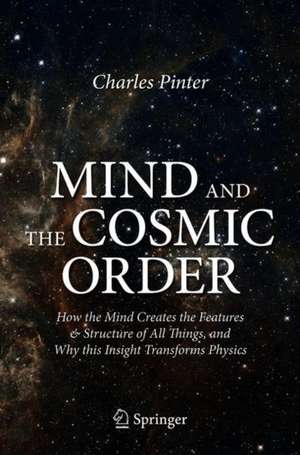Mind and the Cosmic Order: How the Mind Creates the Features & Structure of All Things, and Why this Insight Transforms Physics
Autor Charles Pinteren Limba Engleză Paperback – 5 noi 2020
The topic of this book is the relationship between mind and the physical world. From once being an esoteric question of philosophy, this subject has become a central topic in the foundations of quantum physics. The book traces this story back to Descartes, through Kant, to the beginnings of 20th Century physics, where it becomes clear that the mind-world relationship is not a speculative question but has a direct impact on the understanding of physical phenomena.
The book’s argument begins with the British empiricists who raised our awareness of the fact that we have no direct contact with physical reality, but it is the mind that constructs the form and features of objects. It is shown that modern cognitive science brings this insight a step further by suggesting that shape and structure are not internal to objects, but arise in the observer. The author goes yet further by arguing that the meaningful connectedness between things — the hierarchical organization of all we perceive — is the result of the Gestalt nature of perception and thought, and exists only as a property of mind. These insights give the first glimmerings of a new way of seeing the cosmos: not as a mineral wasteland but a place inhabited by creatures.
Preț: 205.40 lei
Nou
Puncte Express: 308
Preț estimativ în valută:
39.31€ • 40.89$ • 32.45£
39.31€ • 40.89$ • 32.45£
Carte disponibilă
Livrare economică 24 martie-07 aprilie
Preluare comenzi: 021 569.72.76
Specificații
ISBN-13: 9783030500825
ISBN-10: 3030500829
Pagini: 200
Ilustrații: XI, 176 p. 3 illus.
Dimensiuni: 155 x 235 x 18 mm
Greutate: 0.27 kg
Ediția:1st ed. 2021
Editura: Springer International Publishing
Colecția Springer
Locul publicării:Cham, Switzerland
ISBN-10: 3030500829
Pagini: 200
Ilustrații: XI, 176 p. 3 illus.
Dimensiuni: 155 x 235 x 18 mm
Greutate: 0.27 kg
Ediția:1st ed. 2021
Editura: Springer International Publishing
Colecția Springer
Locul publicării:Cham, Switzerland
Cuprins
The Visual World.- Gestalt Wholes.- The Animal Sensorium.- The Birth of Mind.- Brain as Machine: The Materialist View of Mind.- In Search of Reality.- The Universe Observed and Unobserved.- Life and the Observer.
Notă biografică
Charles Pinter was raised in Tangier, Morocco and educated at the French Lycée there. He has a doctorate in mathematical physics from the University of Paris, as well as a degree in journalism. He is known for his work in mathematical logic and model theory. He is professor emeritus at Bucknell University.
Textul de pe ultima copertă
The topic of this book is the relationship between mind and the physical world. From once being an esoteric question of philosophy, this subject has become a central topic in the foundations of quantum physics. The book traces this story back to Descartes, through Kant, to the beginnings of 20th Century physics, where it becomes clear that the mind-world relationship is not a speculative question but has a direct impact on the understanding of physical phenomena.
The book’s argument begins with the British empiricists who raised our awareness of the fact that we have no direct contact with physical reality, but it is the mind that constructs the form and features of objects. It is shown that modern cognitive science brings this insight a step further by suggesting that shape and structure are not internal to objects, but arise in the observer. The author goes yet further by arguing that the meaningful connectedness between things — the hierarchical organization of all we perceive — is the result of the Gestalt nature of perception and thought, and exists only as a property of mind. These insights give the first glimmerings of a new way of seeing the cosmos: not as a mineral wasteland but a place inhabited by creatures.
Caracteristici
A convincingly argued "reality check" for both scientists and general readers Demonstrates that, without mind, the Universe is a "blank slate" Based on newest results from the neurosciences and studies of perception Stimulating ideas that could foreshadow the future direction of physics
